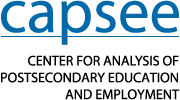Research Projects
CAPSEE researchers analyzed a broad range of educational pathways in two- and four-year colleges. They also evaluated a series of initiatives designed to improve student outcomes, focusing on policies that combine work and study, provide financial aid, and help students choose between educational pathways. In supplemental studies, researchers examined policies aimed at minority-serving institutions and reviewed evidence on the effectiveness of interventions aimed at improving college math readiness.
North Carolina
Using North Carolina data, this study analyzes the employment and earnings outcomes for different community college pathways and awards. Outcomes for this project include employment (e.g., industry and occupation), patterns of employment and unemployment, and earnings.
Michigan
Using Michigan data, this study aimed to estimate the employment and earnings returns to course credits and the additional returns to a credential or degree, and to examine variation in outcomes by program and course content and student characteristics.
Ohio
In this study, the research team examined the college enrollment, persistence, and educational and employment outcomes of Ohio students by using state administrative data matched with employment records.
Virginia
This study used Virginia data to relate educational pathways to the industry and occupation of employment, patterns of employment, earnings, and occupational outcomes, and to assess the labor market returns to developmental education.
California (a & b)
CAPSEE’s research in California consisted of two studies. The first analyzed returns to career and technical education (CTE) pathways; the second analyzed general returns to awards, coursework/subjects, and credits from enrollment in California community colleges.
The Role of the For-Profit Sector in Higher Education
This analysis of national datasets examined the relative size and importance of the for-profit sector and compared education and labor market outcomes for those attending for-profit institutions versus similar students attending public institutions.
Education and Interstate Mobility
This project used national survey data to examine the correlation between educational attainment and patterns of interstate mobility, how mobility evolves over time, and the potential bias in estimating returns using single-state employment data.
Federal Work-Study
This project studied the effects of access to the Federal Work Study (FWS) program on educational and labor market outcomes, including persistence, degree completion, student loan debt, and post-college employment.
Working While Enrolled
This study focused on examining the roles that student employment plays in predicting students’ college success, making use of the same data as CAPSEE’s Ohio project.
One-Stop Career Centers in North Carolina
This analysis of data from North Carolina examined the effectiveness of One-Stop Career Centers located on community college campuses in North Carolina in securing employment for students.
Financial Aid for Community College Students
Using matched education–wage state data, this project examined the academic and labor market effects of receiving financial aid, including aid from major federal programs such as Pell grants and Stafford loans.
Supplemental Study: Minority-Serving Institutions
This project consisted of analyses to clarify differences among institutions considered MSIs based on federal designation, federal MSI fund receipt, and institutional and student characteristics.
Supplemental Study: Improving College Math Readiness
This project reviewed the research on the effectiveness of strategies that seek to improve the math preparedness and success of high school students entering college.
